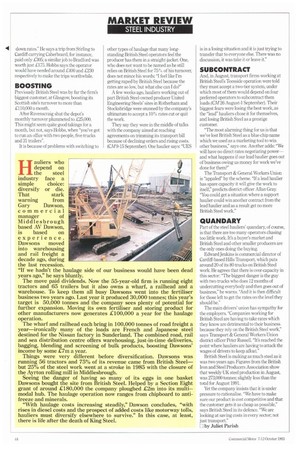H auliers who t depend on steel industry face a simple choice: diversify or die.
Page 46

If you've noticed an error in this article please click here to report it so we can fix it.
That stark warning from Gary Dawson, commercial manager of Middlesbrough based AV Dawson, is based on experience. Dawsons moved into warehousing and rail freight a decade ago, during the last recession. "If we hadn't the haulage years ago," he says bluntly.
The move paid dividends. Now the 55-year-old firm is running eight tractors and 63 trailers but it also owns a wharf, a railhead and a warehouse. To keep them all busy Dawsons went into the fertiliser business two years ago. Last year it produced 30,000 tonnes; this year's target is 50,000 tonnes and the company sees plenty of potential for further expansion. Moving its own fertiliser and storing product for other manufacturers now generates £100,000 a year for the haulage operation.
The wharf and railhead each bring in 100,000 tonnes of road freight a year—ironically many of the loads are French and Japanese steel destined for the Nissan factory in Sunderland. The combined road, rail and sea distribution centre offers warehousing, just-in-time deliveries, bagging, blending and screening of bulk products, boosting Dawsons' income by some £7m a year.
Things were very different before diversification. Dawsons was running 56 tractors and 75% of its revenue came from British Steel— but 25% of the steel work went at a stroke in 1985 with the closure of the Ayrton rolling mill in Middlesbrough.
Seeing the danger of having so many of its eggs in one basket Dawsons bought the site from British Steel. Helped by a Section Eight grant of around £180,000 the company ploughed £2m into its multi-modal hub. The haulage operation now ranges from chipboard to antifreeze and minerals.
"With haulage costs increasing steadily," Dawson concludes, "with rises in diesel costs and the prospect of added costs like motorway tolls, hauliers must diversify elsewhere to survive." In this case, at least, there is life after the death of King Steel.




























































































